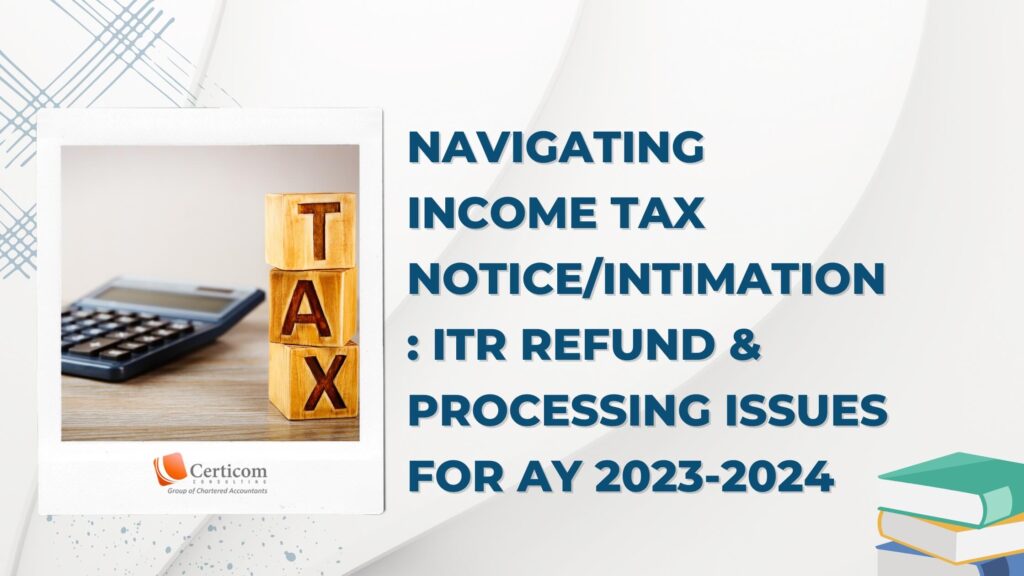NAVIGATING INCOME TAX NOTICE/INTIMATION: ITR REFUND & PROCESSING ISSUES FOR AY 2023-2024

Filing income tax returns (ITRs) is an essential annual ritual for individuals and businesses alike. However, the Income Tax Department faces several challenges in processing ITRs, leading to delays in refunds. In a press release dated 05/09/2023, the department highlighted three primary issues for AY 2023-2024: unverified ITRs, ITRs with pending information, and delays in issuing refunds due to un-validated bank accounts.
Issues Involved
1. Unverified ITRs
As of 04/09/2023, approximately 14 lakh ITRs for AY 2023-24 remain unverified by taxpayers. Failure to verify ITRs promptly can result in significant processing delays. The verification process ensures the authenticity of the filed return and must be completed to initiate processing. Taxpayers are urged to complete this crucial step immediately to expedite the processing of their returns. It is important to note that ITR e-verify timeline has been reduced from 120 days to 30 days after filing of ITR. Read: Over 88% of ITRs Processed for AY 2023-24 with 2.45 Crore Refunds Issued
2. ITRs with Pending Information
Another issue pertains to around 12 lakh verified ITRs for which the Income Tax Department has requested additional information. The department communicates these requests through the taxpayers’ registered e-filing accounts. It is essential for taxpayers to respond to such requests promptly to facilitate the processing of their returns. Ignoring or delaying these communications can lead to further delays.
3. Un-validated Bank Accounts
In numerous cases, ITRs have been successfully processed, and refunds have been determined. However, the Income Tax Department faces challenges in issuing refunds because taxpayers have not validated their bank accounts for refund purposes. Taxpayers are urged to validate their bank account details through the e-filing portal to receive their refunds seamlessly.
Root Cause Analysis
The root causes of these issues often revolve around taxpayer negligence or a lack of awareness regarding essential procedures:
1. Negligence
Taxpayers may overlook the importance of timely verification or responding to departmental communications. This negligence can be due to a lack of understanding or the assumption that these steps are not crucial.
2. Lack of Awareness
Many taxpayers may not be fully aware of the verification and communication processes required for ITRs. This lack of awareness can result in non-compliance.
Resolution
1. Unverified ITRs
Taxpayers should promptly verify their ITRs through the e-filing portal. The process is straightforward and typically involves using Aadhar OTP, EVC (Electronic Verification Code), or sending a signed physical copy of ITR-V to the Centralized Processing Center (CPC). Clear step-by-step guidelines are available on the official website.
2. ITRs with Pending Information
Taxpayers must respond to departmental requests for additional information through their registered e-filing accounts. Regularly check the e-filing portal for communications from the department and provide the required information within the stipulated time frame.
Additionally, taxpayers should be aware that the Income Tax Department may scrutinize claims for tax deductions or exemptions under various sections of the Income Tax Act. If the claimed deductions or exemptions significantly exceed the amounts reflected in your Form 16, the system may require you to provide supporting documents to verify the genuineness of your claims. To avoid delays in the processing of your ITR and refunds, ensure that you maintain proper documentation for all deductions and exemptions claimed. This documentation may include:
Investment Proof
Keep records of investments made under Section 80C (e.g., Provident Fund contributions, Life Insurance Premiums, ELSS investments, etc.), as well as other sections like 80D (health insurance premiums), 80G (donations), and 80E (education loan interest).
Receipts and Invoices
Maintain receipts and invoices for expenses related to deductions, such as medical bills for Section 80D, donation receipts for Section 80G, and interest certificates for Section 80E.
Home Loan Documents
If claiming deductions on home loan interest and principal repayment under Section 24(b) and Section 80C, respectively, ensure you have loan statements, interest certificates, and property registration documents.
HRA Declaration
If you receive House Rent Allowance (HRA) and are claiming HRA exemptions, keep rent receipts and a copy of your rent agreement.
Capital Gains Statements
For individuals with capital gains, maintain records of stock transactions, mutual fund investments, and real estate transactions.
By maintaining accurate and organized documentation for all deductions and exemptions claimed, you can not only ensure the smooth processing of your ITR but also have the necessary evidence to support your claims in case of an audit or verification by the Income Tax Department. Remember that accurate record-keeping is an integral part of responsible tax compliance.
3. Un-validated Bank Accounts
Taxpayers are encouraged to validate their bank account details through the e-filing portal. Ensure that the bank account provided for refund purposes is active and belongs to the taxpayer. This proactive step will facilitate the seamless disbursement of refunds.
Other Considerations
Taxpayers
- Stay informed about changes in tax laws and deadlines by regularly visiting the official website and subscribing to updates.
- Keep accurate records of all financial transactions and investments to ensure accurate reporting in ITRs. Utilize the services of tax professionals or seek guidance from experts for complex tax matters.
Read More: Income Tax Audit Due Date is nearing: All you need to Know about Tax Audit u/s 44AB
In AY 2023-2024, addressing the challenges faced during ITR processing is crucial for taxpayers and tax professionals alike. Unverified ITRs, pending information, and un-validated bank accounts are obstacles that can be overcome through awareness and timely action. By following the proposed resolutions and staying informed, taxpayers can ensure a smoother ITR processing experience, timely refunds, and compliance with tax regulations. It is our collective responsibility to embrace these solutions and contribute to a more efficient tax ecosystem.
Related Post
Resident’s Guide to Buying NRI Property in India
Flipkart ESOP Compensation: ₹11 Crore Payout – Salary or Capital Receipt?
Book A One To One Consultation Now For FREE
How can we help? *




